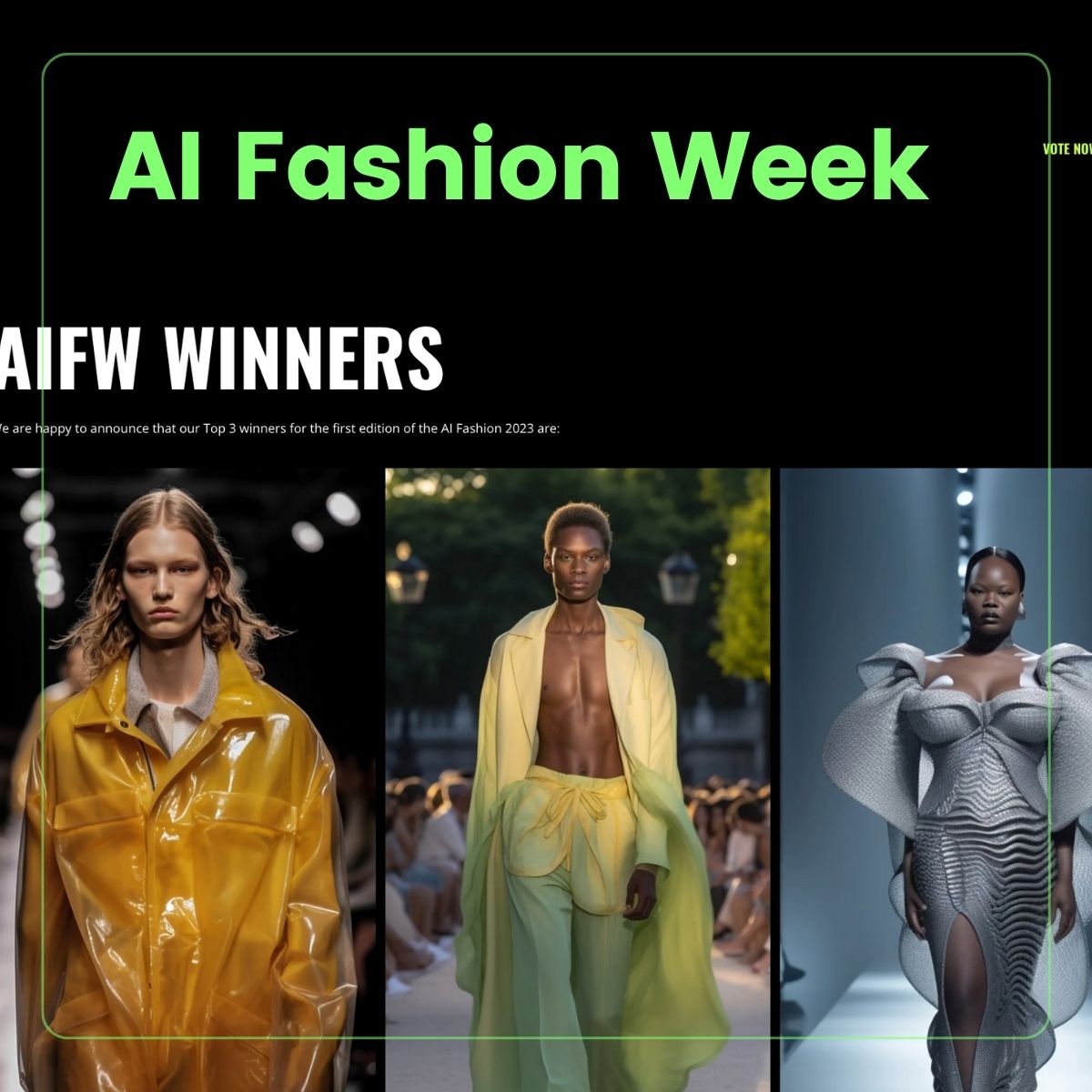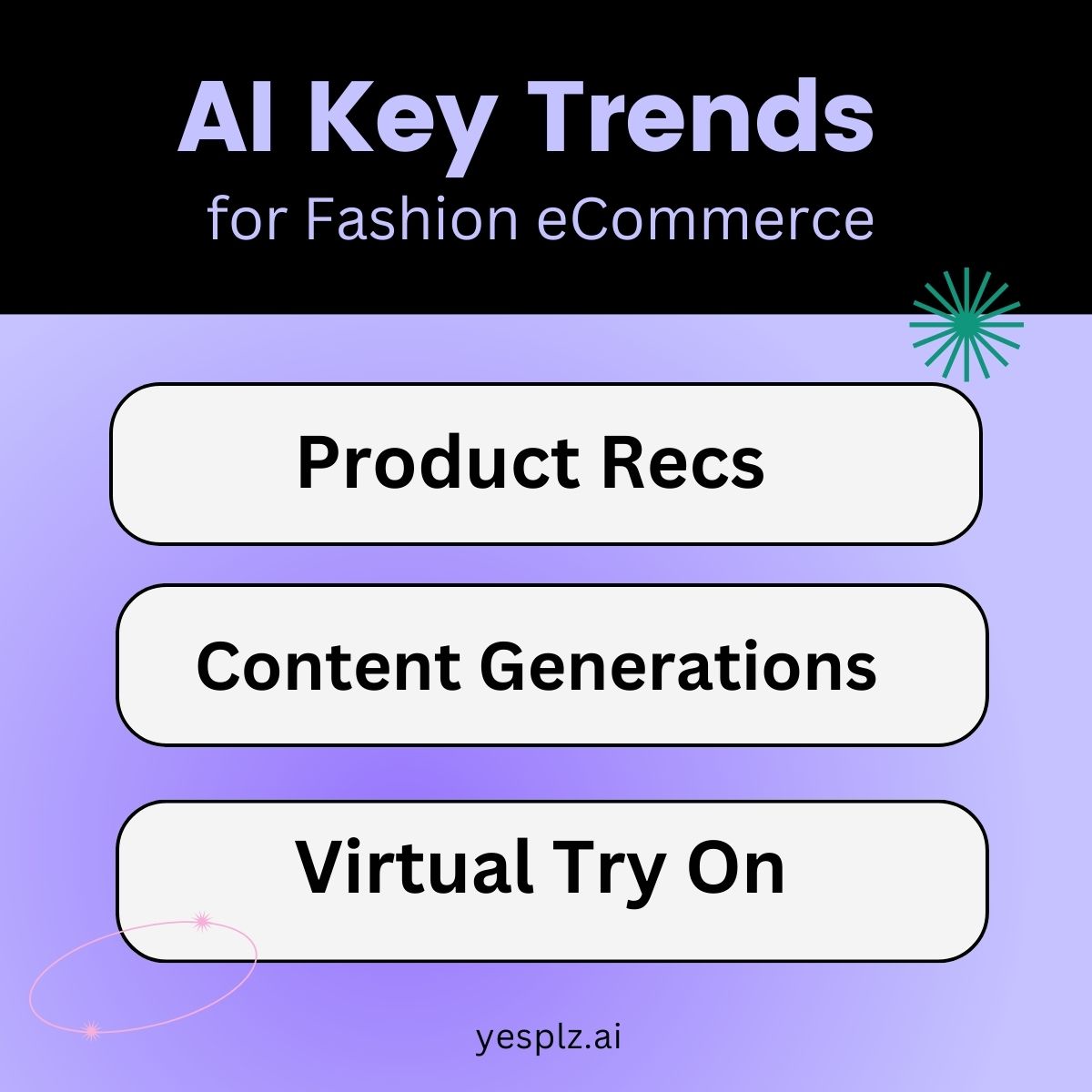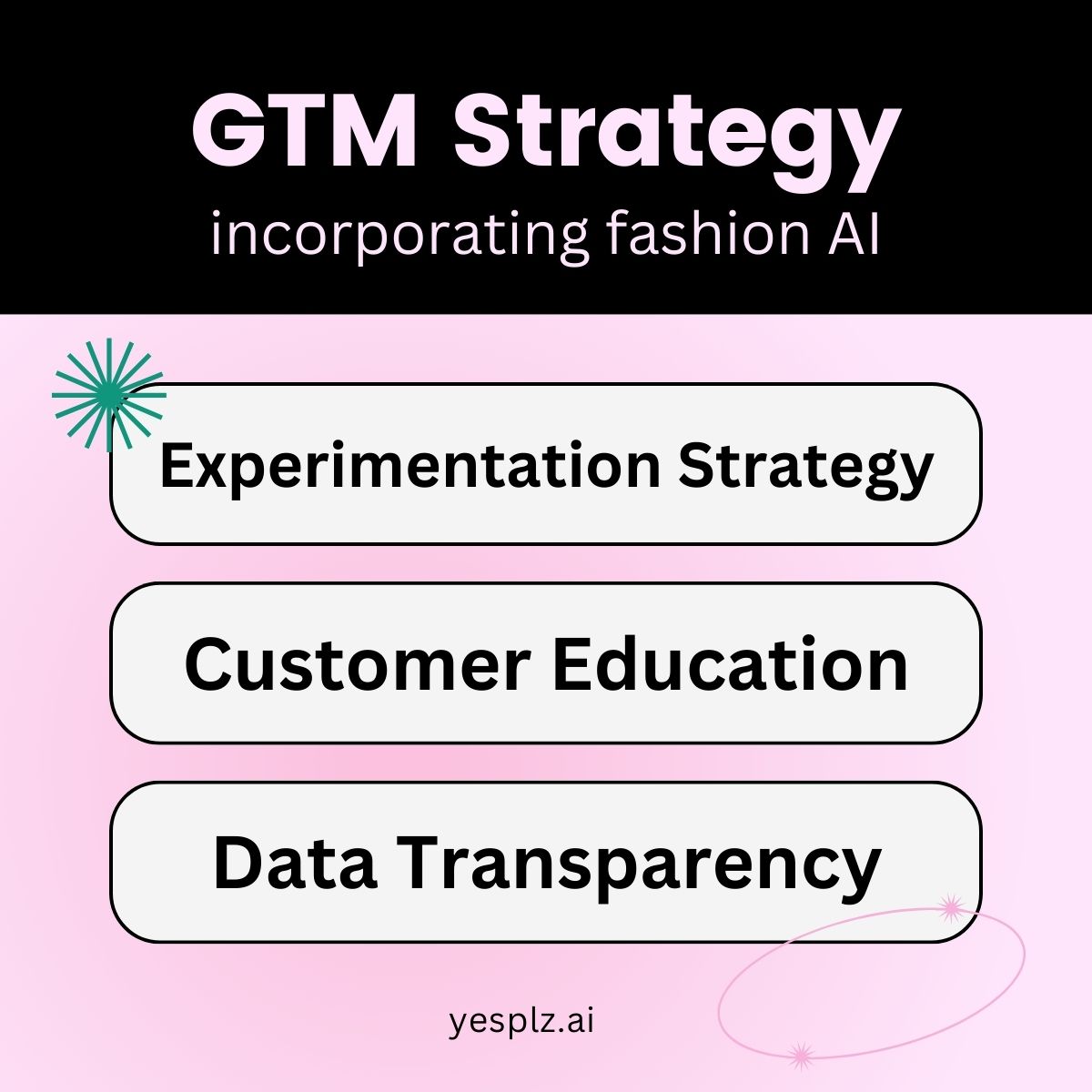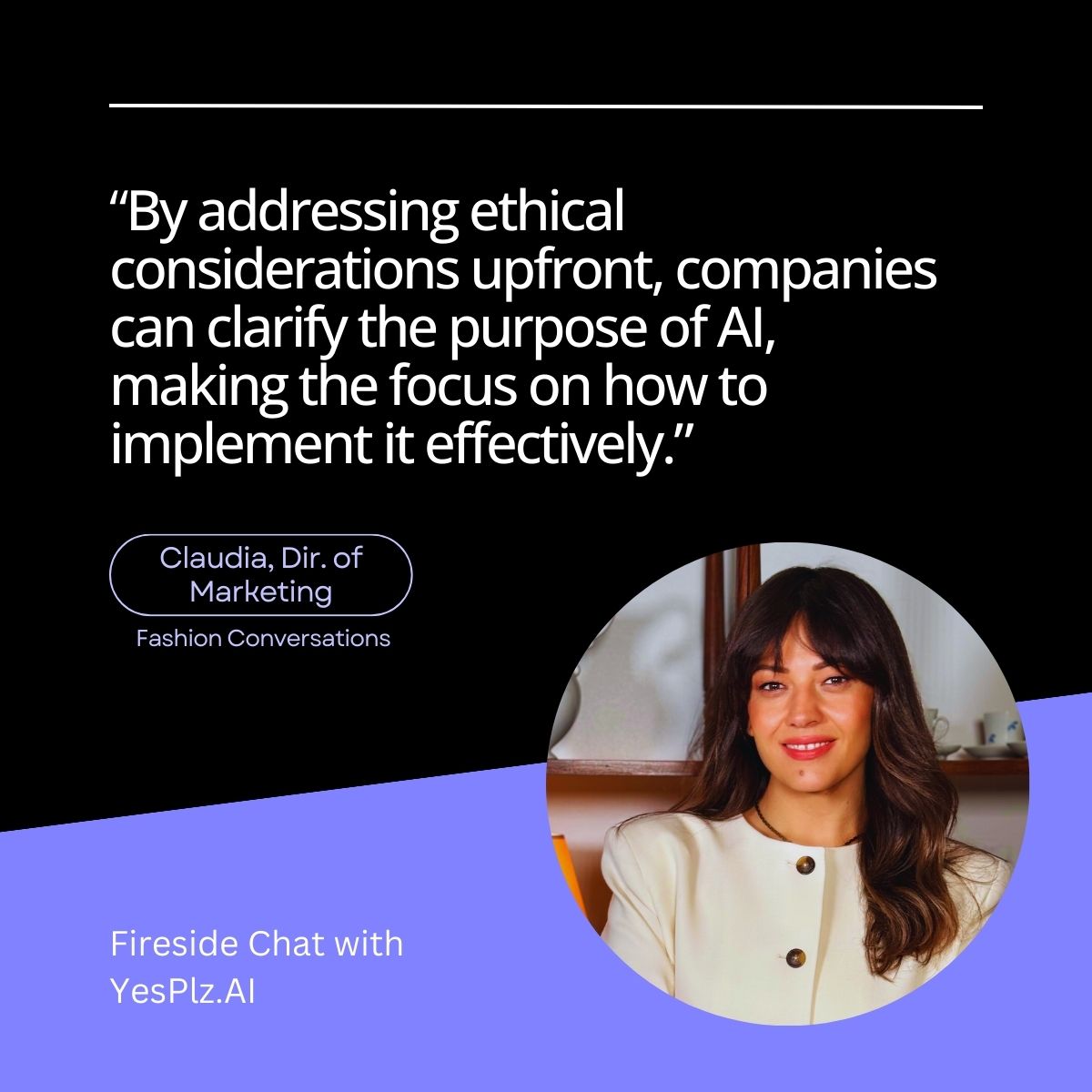Insights from Industry Expert Claudia Crangsu
by YesPlz.AINovember 2023

In the realm of AI, we wonder how to successfully integrate AI into our fashion eCommerce. Today, we sat down with Claudia Crangsu, an industry expert who has worked at FarFetch, Worldpay, and Vodafone, integrating various technologies into the fashion eCommerce space.
In this blog, we'll cover the key highlights of the conversation, including:
A little bit about Claudia:
Claudia effortlessly blends the worlds of fashion, technology, and eCommerce. Renowned for her ability to seamlessly integrate advanced technological solutions with contemporary fashion trends, she has carved a niche for herself in launching products globally. Committed to innovating the blend of technology and marketing, with her passion for understanding cultures and human behavior, to consistently raise the bar in her field. As a graduate of the 2023 Oxford Artificial Intelligence Programme, she applies a refined touch to integrating AI in fashion retail, offering deep, data-driven perspectives. In her role as a Tech & Retail Startup Advisor, Claudia adeptly steers emerging fashion-tech initiatives towards successful market introductions.
The fashion tech market, especially in AI for eCommerce, is undergoing a transformative stage. AI is driving innovation, particularly in enhancing customer experiences. Retailers and brands are recognizing the cost-effectiveness of integrating AI to build relationships and create personalized experiences.
An example is the AI fashion week where designers used AI to generate collections, which were then sold as physical garments on platforms like Revolve.

In eCommerce, AI is addressing challenges such as streamlining the value chain, accelerating product time-to-market, and predicting consumer demand for sustainable production cycles.
Additionally, AI is tackling traditional issues like product discovery, inspiration, size, and fit by leveraging the vast data available in the fashion space. Overall, the impact of AI is prominent in shaping the future of fashion eCommerce.

Product recommendations is still one of the biggest trends, even more present now with Google new AI tool where they give you gift ideas
User generated products using Gen AI to create photorealistic variations of items they’d like to see — and then find the real products in Google’s shopping ecosystem that offer the closest match.
Virtual Try On on a range of different models, to men’s tops after introducing the technology on women’s tops in June - this increase 30% quality customer interactions
Overall, AI plays a crucial role in these trends, shaping the landscape of fashion tech.
In the fashion tech industry, AI can be seen as a tool rather than a threat to job security. It's advisable for professionals to identify repetitive tasks and consider AI as a tool to enhance efficiency.
In fashion e-commerce, AI can empower marketers to gather and utilize customer information effectively for targeted campaigns. Similarly, visual merchandisers can use AI to create personalized visual content for customers.
While some job roles may evolve and require retraining, AI is not expected to replace jobs entirely. Instead, it could shift the focus to areas where human touch is crucial, reallocating resources to more meaningful interactions.
The impact of AI on job roles varies, with customer service potentially being automated while luxury industries may maintain personal interactions. The comparison is made to historical industrial revolutions, emphasizing the need for adaptation and evolution.
This is our third industrial revolution. So I think hopefully we're going to do a good job this time to adapt and evolve with it as well.

Working with a skilled experimentation lead in a previous role highlighted the importance of having a well-thought-out experimentation strategy.
As a go-to-market expert, understanding how to conduct A/B tests or other experiments has proven critical in adapting to the evolving landscape.
Customer education is a key focus, recognizing that not everyone understands the nuances of AI. Reflecting on my experience in FinTech, creating a white paper was pivotal in educating the audience about the advantages of our AI product.
Highlighting transparency about customer data as a currency in the AI space, I've seen positive examples like Meta's approach. Being transparent about data usage builds trust with customers, making them more willing to provide access to their data.
Whether building internally or integrating, understanding how data will be leveraged in the AI model is crucial for maintaining full transparency. Lastly, creating a feedback loop is a critical aspect of go-to-market strategies for AI, ensuring continuous improvement and adaptation to customer needs.
Ethical principles play a significant role in successful integration.
Establishing transparent guidelines, such as diverse and inclusive data collection, and setting limits on the impact of AI on staff contribute to positive change management. By addressing ethical considerations upfront, companies can clarify the purpose of AI, making the focus on how to implement it effectively.

This proactive approach fosters staff understanding, encourages retraining for impacted roles, and aligns the team toward a shared vision of incorporating AI seamlessly into the company's operations.
Certainly, there's significant potential in digitalizing the secondhand luxury market, as currently only 30% is online. Tools to facilitate this transition are crucial.

Virtual try-on and improving size and fit predictions offer untapped opportunities, considering the challenges of returning items. Another area is predicting garment suitability for repurchase, which is a growing trend but lacks accurate tools.
Inclusive fashion is also an underserved area. The fashion industry struggles to address the needs of people with disabilities, but AI could potentially innovate by converting individual product needs, such as measurements, into bespoke garments. This could be a transformative space where AI fills a gap that traditional methods couldn't.

I see the future as highly personalized and immersive shopping experiences.
Retailers need to swiftly capture cultural trends, like the recent pink movement inspired by the Barbie movie, and translate them into campaigns and merchandise.
Companies should focus on partnering with experts and adopting tools that enable them to efficiently create personalized shopping experiences at scale. This approach will help them stay ahead in the dynamic landscape of fast-moving customer expectations and emerging trends.

We thank Claudia for sharing her valuable insights and compelling examples. You can watch the full discussion in this video.
Book a demo call today to discover how YesPlz can enhance your eCommerce business through seamless AI integration.

Written by YesPlz.AI
We build the next gen visual search & recommendation for online fashion retailers

What are product tags used for? It’s a solution to low search CTR, limited filtering, manual collection curations, and more. Discover 6 essential use cases of product tags to transform search, filtering, SEO, and collections to boost sales.
by YesPlz.AI

Discover 4 proven fashion recommendation strategies that boost conversions. Learn how About You, J.Crew, W Concept, and Cider drive sales.
by YesPlz.AI